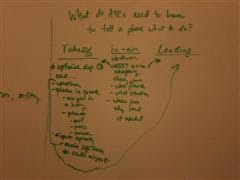So I asked him what the system of systems was, since systems engineering is itself an engineering system, fulfilling the standards (by one route of defining it) by being complex, large-scale, interdisciplinary, and an open system. The recursive meta-ness elicited groans from Chris. We tossed around ideas for a while, landing on George's definition of systems engineering as an inherently dynamic discipline because it grouped previously complex technologies into simple systems.
For instance, the making of steel... becomes part of the system of a ball bearing... which can be used on the shaft of a car... that gets sensors bolted on to run the DARPA grand challenge. Each advance in technology depends on the previous generation's technology becoming "common" enough to be used as a component. It's almost fractal-like complexity with boxes within boxes within boxes, only spiraling outwards and forward in time. At this, Chandra got to the board and drew this diagram, which USAF Maj. Dan Ward had presented to the seniors last week. It's called the Simplicity Cycle, and it describes product development.

The oversimplified version is that projects start simplistic (R1) with very little information, balloon up into complexity (R2), and then either blow up into complicatedness (R3) or find ways to turn that complexity into a new, richer kind of simpleness. Systems engineering, Chandra said, does exactly that; turn complex things into simple ones. And they're aided by the flow of time, which tends to push things from simple (R4) to simplistically obvious (R1), allowing engineers to use them as subcomponents in new and more complicated (but eventually simple) things.
At this point, someone (Boris, I think) said "It's like UOCD!" And indeed it is. If you flatten out the path that goes from R1 to R2 to R4, you get this, which is pretty funky.


